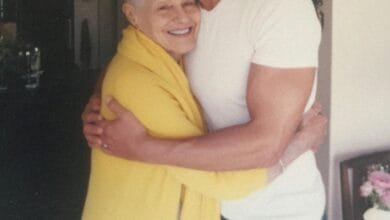I Married a Widower with a Young Son.

– One Day, the Boy Told Me His Real Mom Still Lives in Our House
When I married Ben, a kind and devoted widower, I knew I was entering not just a marriage, but a new life that included Lucas, his seven-year-old son. Ben had lost his wife, Irene, three years earlier and had been raising Lucas on his own since.
From the beginning, I made it clear that I didn’t want to take Irene’s place — I just wanted to be part of their new story. Over time, Lucas welcomed me warmly. We started building a bond — with games, homework help, and favorite meals. He even started calling me “Mom,” which touched me deeply. Ben and I exchanged tender looks every time it happened.
But everything changed one ordinary night, while I was putting Lucas to bed. He looked at me seriously and whispered:
— “My real mom still lives here.”
I thought it was just his imagination. I smiled, ran my hand through his hair, and said his mom would always live in his heart. But he shook his head and insisted:
— “No… she’s here. I see her sometimes.”
That gave me chills, but I tried to brush it off.
In the following days, strange things started happening: toys I had put away would reappear exactly where they were before. Kitchen cabinets I’d reorganized would go back to their original setup overnight. And the photo of Irene, which I had moved to another room, always reappeared in the living room — spotless, as if someone had lovingly cleaned it.
I asked Ben if he had been rearranging things, but he denied it with a nervous smile. Yet something in his eyes told me he was unsettled too.
Then one day, while Lucas and I were working on a puzzle, he suddenly stopped, looked me straight in the eyes, and said:
— “Mom says you shouldn’t touch her things.”
I turned to the hallway, my heart racing. This was no longer just a child’s imagination.
That night, while everyone was asleep, I went up to the attic where Ben kept some of Irene’s belongings. I searched through boxes of photos, letters, and her personal items. But then something caught my attention — a small door hidden behind some boxes. I pulled them aside, turned the rusty doorknob, and found a narrow room with a bed covered in blankets.
And there, sitting on the bed, was a woman I recognized instantly from the family photos: Emily, Ben’s sister.
She looked at me with sadness.
— “I’m sorry. You weren’t supposed to find out like this. I’ve been here since Irene died. I just… never left.”
Emily had isolated herself, mentally fragile, living in hiding in the attic. She had been talking to Lucas, making him believe that Irene was still around.
I rushed downstairs to confront Ben. He turned pale when he realized the state Emily was in. He admitted he had tried to help her, but she had always refused. Now, it was clear she needed professional care.
That night, we installed a small camera near the attic door. We saw Emily come out and speak gently to Lucas — like a mother would.
The next day, Ben sat down with Lucas and explained:
— “Your aunt Emily loves you very much, but she’s sick. Your mom, Irene, has passed away, and no one can replace her. But she’ll live forever in your heart.”
Lucas was confused, but he understood. Ben took Emily to the doctor. It was hard — she resisted, cried — but in the end, she agreed to be admitted.
Slowly, peace returned to our home.
Lucas missed her at first, but eventually came to terms with the truth. The three of us moved forward. With love, patience, and honesty, we began to heal the kind of pain that no one sees.
I didn’t expect all this when I married Ben. But now I understand: a family is built not only with love, but with everything we are willing to face together.
💳 Awareness About Credit Card Use
The credit card is one of the most popular financial tools in the world. It offers convenience, security, and even benefits like miles, cashback, and loyalty programs. However, when misused, it can become a silent trap capable of severely damaging anyone’s financial health.
Many people use credit cards as an extension of their salary, forgetting that every amount spent will be charged later. The false sense of “easy money” often leads to debt accumulation — especially when the full bill isn’t paid, and the user resorts to the minimum payment. This activates the revolving credit system, which has one of the highest interest rates in the Brazilian market, sometimes exceeding 300% annually.
Another risk lies in installment payments, particularly for impulsive purchases. When people lose track of how many installments they’re paying, their monthly budget becomes a confusing puzzle. Often, consumers find themselves without room for basic expenses and end up relying on new credit to pay off old debts — creating a vicious debt cycle.
How to avoid this trap?
- Plan your purchases and ask yourself: “Would I buy this if I had to pay it in full today?”
- Whenever possible, pay your credit card bill in full.
- Avoid installment payments for everyday items like food or entertainment.
- Keep a clear record of your monthly expenses.
- Use finance apps or write down your spending manually.
A credit card should be seen as a facilitator — not as a solution for financial imbalance. Financial education is the best way to ensure this tool works in your favor, not against you.





